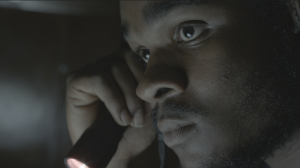BFI Festival Special: ‘African Apocalypse’
Written by Tola Ositelu

British-Nigerian activist Femi Nylander came to prominence as one of the leading voices of the Oxford University ‘Rhodes Must Fall’ campaign. In his latest venture as the subject of a documentary by Rob Lemkin, he pursues another anti-imperial preoccupation. Having had his imagination captured by Mr Kurtz from Joseph Conrad’s infamous Heart of Darkness, Nylander goes on a quest for the real life colonial sociopath on whom he’s supposedly based.
From the halls of his Oxbridge Alma Mater to West and Central Africa, Femi’s search leads him to senior French officer, Paul Voulet. Modern day Niger, the territory he helped his imperial masters to commandeer, is currently one of the least developed states in the world, according to the UN.
The memory of Voulet’s massacres is still raw in the villages his army ravaged. Beautiful Nigerien schoolgirls weep fresh tears over their slain ancestors. It’s a wound ripped open daily whilst France continues to exploit its former colony.
Lemkin’s African Apocalypse says as much about the complexities of post-colonial identities as it does about the barbarism of Empire. Nylander is of West African extraction but identifies as both English and European; a ‘beneficiary of Empire’. At times, it seems, he knowingly occupies the role of the wary Westerner, assessing the natives from an emotional and cultural distance. Even his Nigerien guides accuse him of being oddly detached. In Nylander’s defence, this is indicative of a paradox confronting the formerly colonised and their descendants based in the Global North.
There is something self-consciously melodramatic about Nylander’s narration, almost comically so. He often monopolises the film’s focus such that it doesn’t always serve the central theme well. Femi speaks some French and appears to have also learned the local language. Whether for immersive purposes or affectation, it’s unclear.
A brief parenthesis is dedicated to how France still benefits from extracting uranium from Niger. There’s an upbeat story about homegrown solar panel tech and a brief epilogue referencing BLM.
However, not enough attention is given to tracing the link between colonialism past and present. In doing so, it denies Nigeriens, or at least their leaders, of agency. If European interference is overwhelmingly to blame for impoverishing Niger, it has been with the complicity of indigenous Quislings. Voulet might have helped start the fire but others have kept it burning.
Yet the shortcomings of African Apocalypse pale besides what it does achieve. That is, bringing to the fore another horrific, if little known, chapter in colonial history; as conveniently forgotten as the lives brutally cut short by Voulet and his men.
African Apocalypse is part of this year’s Virtual BFI Festival: 7-18 October 2020.
This review can also be found on on Tola’s blog.


